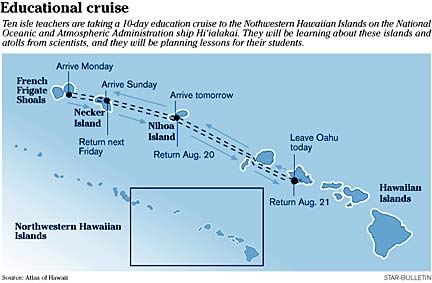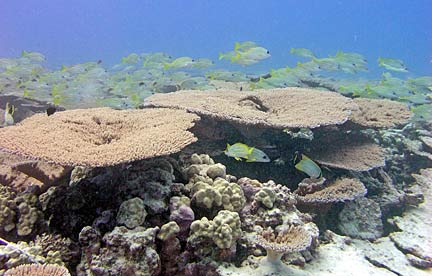STARTING THE JOURNEY

|
Ocean classroom
Educators go to the Northwestern
Hawaiian Isles for reef lessons
Ten Hawaii educators embark today on an unprecedented trip to the Northwestern Hawaiian Islands, where they will experience firsthand a unique coral reef ecosystem.
|
|
In shipboard classrooms, snorkeling among coral reefs and on shore at French Frigate Shoals' Tern Island, the teachers will be students -- soaking up daily lessons on the geography, history and natural wonders of the most remote part of the state.
"These teachers will be able to interact with students about their personal experience," said Rusty Brainard, chief of the coral reef ecosystem division of the Pacific Islands Fishery Science Center in Honolulu.
The teachers were chosen from among 80 applicants who competed for the chance to take the voyage. All have promised to develop lessons that incorporate what they learn on the voyage.
NOAA has allowed individual teachers to go along on some research missions and develop classroom lessons from the experience. But never before in the country has a whole group of teachers had a mission centered around them, said Andy Collins, education coordinator for the Northwestern Hawaiian Islands Coral Reef Ecosystem Reserve.

"All of the agencies' objective in managing this place for the future is not to bring people up here, not to have ocean tourism, but to bring the place back ... the wonder and the beauty," Collins said. "It's spectacular, but (most people) don't need to go there."
For example, Collins noted, fishermen depleted the area of akule in the 1950s, and it took a decade for the fish to replenish. "Nature is in balance there and it's very fragile," he told the cruise participants yesterday at an orientation for the trip at Hanauma Bay.

Cindy Hunter from the University of Hawaii and Sabra Kauka from Kauai prepared to swim at Hanauma Bay Nature Reserve yesterday as part of a water safety course prior to boarding the NOAA Hi'ialakai research vessel. This will be the first voyage that will allow educators from universities, middle and high schools aboard for a 10-day journey to the Northwestern Hawaiian Islands.
"I don't think it's extreme for the people of Hawaii and the world to have a place that we haven't trashed," Hunter said.
The teachers were obviously excited about seeing the remote islands and atolls that stretch 1,200 miles northwest of Kauai. They are already on board with the conservation ethic promoted by the three agencies in charge of the area: the Northwestern Hawaiian Islands Coral Reef Ecosystem Reserve, the U.S. Fish and Wildlife Service, and the state Department of Land and Natural Resources.
Many of the participants have already been teaching about the remote region.
Allen Golden, a seventh-grade social studies teacher at Jarrett Middle School in Palolo, has helped create multidisciplinary units at his school centered on the Northwestern Islands.
When students learned that before humans settled in the main Hawaiian Islands, they were as full of fish and other sea creatures as the Northwestern Islands still are, they were amazed, Golden said.
"I tried to get them to see that this is how the main Hawaiian Islands were before," he said.
When Golden told his students of past proposals to commercialize the Northwestern Islands -- as a Frank Fasi idea of having a casino hotel on Midway Island -- they were aghast, he said.
"I had them write what they thought about an idea like that, and they were so angry," Golden said.
After an in-water snorkeling safety session at Hanauma Bay, the teachers toweled off, got some takeout dinners and sat through several hours of lecture last night on identifying fish. The ship was to leave Snug Harbor at 9 a.m. today and is expected to reach Nihoa Island about noon tomorrow.
Said Ann Bell, a U.S. Fish and Wildlife Service outreach educator who will be on the voyage, "I just can't wait to see this place through your eyes and find out what inspires you."
E-mail to City Desk
[News] [Business] [Features] [Sports] [Editorial] [Do It Electric!]
[Classified Ads] [Search] [Subscribe] [Info] [Letter to Editor]
[Feedback]
